Notes on Nomad Life - Pt 1: Logistics
The Nuts and Bolts of My Life on the Move; Answers to FAQs;
As some of you may already know, I live a sort of a nomadic life.
What’s this post about?
This post is an attempt to pen down my thoughts on this nomadic lifestyle - why, what, how etc and answer common questions I get from friends, family & Twitter.
Next time someone DMs me on Twitter asking about travel recommendations, my budget, or how I plan, I can just redirect them here, though I risk sounding rude.
Sidenote: Please don’t DM like I’m ChatGPT free version, you will be ignored.
Structure
This post is written in a Q&A structure where I’ll address the most common questions I receive. In this part, I’ll focus on questions that are more logistics oriented than personal/emotional aspects. I'll cover those in a separate post - make sure to subscribe so you don’t miss it.
These are the questions I answer in this part:
Whenever I meet new people, the topic of travel invariably comes up with this question. So, it seems like the perfect place to start.
Where do you live?
I grew up in Thiruvananthapuram (TVM), Kerala. My parents still live there. Besides TVM, I’ve lived in Ropar (Punjab), Mumbai & Bangalore. However, nowadays, I don't have a permanent base. For the past 2.5 years, I’ve embraced a nomadic life - travelling around and shifting places every 3 weeks or so.
Where all have you traveled during this time?
Over the past 2.5 years, I’ve spent most of my time in Himachal, Rajasthan, Thailand, Nepal, and more recently, Uttarakhand. This month, I’ve been exploring Kerala - surprisingly, even though I’m a mallu, this is the first time I’m exploring Kerala.
I occasionally visit my home in Trivandrum every couple of months.
How did this start? What pushed you into this way of life?
Long story.
Ever since college, I've fantasized about getting a remote job and travelling the world. This dream finally became a reality thanks to Covid. Okay not gonna lie, it feels a little weird to say “thanks to Covid”.
After the first wave subsided, fed up staying at home for months, I began to seriously consider taking a workation. Initially, it was just a fantasy. I doubt my low-agency ass would’ve acted on it.
Fortunately, around Feb 21’, a couple of my friends were planning a month-long Goa workation and invited me to join them. From Goa, I moved to Rishikesh for another workation with a different friend group. At the end of these 2 weeks, everybody wanted to go back home, except me and Neil (whom some of you may know). So we impulsively decided to go to Kasol, with no plan.
About a week into our stay in Kasol, the 2nd wave hit and we ended up staying there for 2 months! Eventually, Neil went back home and I was on my own. With the newfound confidence gained from exploring Kasol & neighbouring villages, I embarked on my first solo trip to Shoja and thus, this journey began.

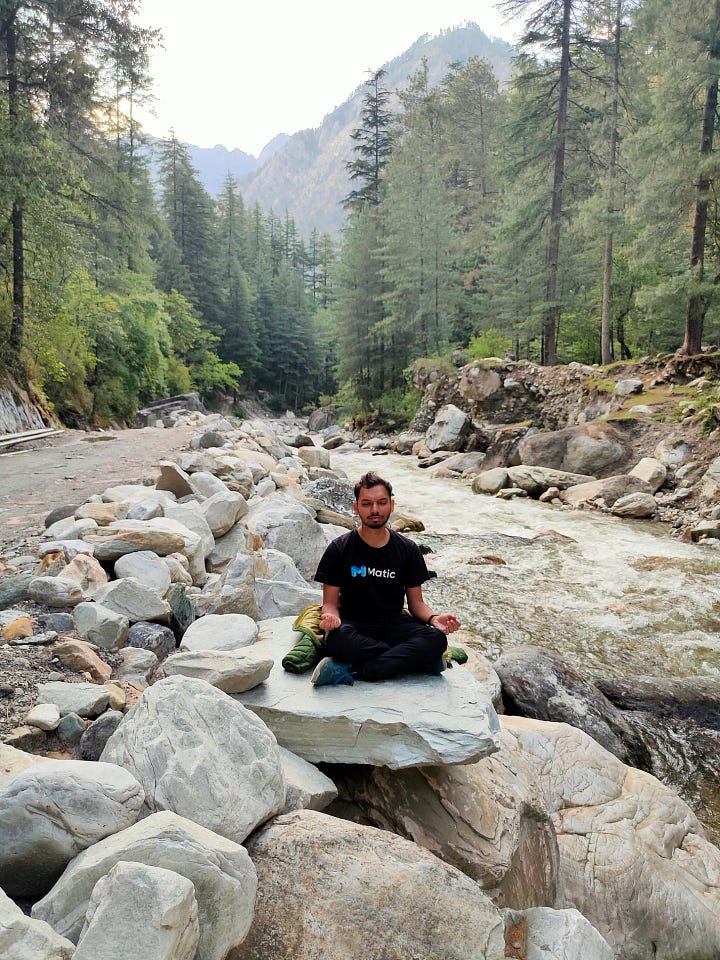
The incremental nature of my journey was crucial in helping me overcome my fears and apprehensions about travelling solo. Otherwise, I might still be stuck in the fantasy stage. I’m NOT some crazy adventurer; I simply gave traveling a try, found that I enjoyed it, and decided to continue.
How long do you stay at a place?
Erm, it varies quite a bit, mainly due to work commitments and personal obligations, but typically I find myself staying in a place I like for about a month.
Originally, this time-frame was the result of working while travelling. When I was employed, staying for at least a few weeks was necessary to really explore a place since my explorations were limited to weekends. This meant that on most days I was just living my regular life in the new location, rather than ticking off a “things to do” list like a typical tourist.
This system has stuck with me. I continue to travel this way, even though I’m not employed at the moment.
Besides, going out exploring every single day is not sustainable long-term. You need time to rest, have personal moments, and enjoy some lazy hours.
What’s your budget? I would love to do this too, but I don’t have the money
I’ll be honest: my budget is pretty high compared to my other nomad friends.
Caveats
As I’ve previously written, I’m in a fortunate financial position due to being well-compensated in my previous jobs. I’m also debt free, my parents are not financially dependent on me, and I’m unmarried. My lifestyle is simple, and I desire little. After giving up my apartment in Bangalore in 2020, I also freed myself from rent payments.
These factors have allowed me to accumulate a good amount of savings, meaning budget constraints rarely limit my (domestic) travel. I recognize and am grateful for this privilege.
Numbers
In these 2-3 years, my monthly living expenses have ranged from 30,000 INR to 1.2 lakh. On average, I tend to spend around 80,000 INR per month. This includes all my expenses except for tech and SaaS subscriptions (my Bumble subscription cost isn't really relevant here no?).
My travel expense vary quite a bit, based on my mood, the type of accommodation, nature of the location (city or village), available modes of transport, etc.
For instance, if I’m seeking solitude, I might opt for a private room and burn ~1000-2000 per night. In contrast, if I’m in a social mood, I’ll stay at a hostel, where I pay 300-800 INR per night.
From my experience, Hostels in mountains tend to be cheap - I’ve lived at as low as 150 INR per night. In more urban areas, like Udaipur or Kerala, dorm beds go for 500-900 INR.
Budget travel is all about tradeoffs
I’ve met folks who travel on monthly budgets of 10,000 INR -30,000 INR, especially in the mountains. They:
hitchhike, use public transport or shared cabs whenever possible.
actively search & negotiate the cheapest stay or sometimes resort to couchsurfing (rare).
eat local desi food from basic restaurants.
You pick your tradeoff.
Long travel & entry-exit transport costs
One under-appreciated aspect of slow travel is how entry and exit travel costs, like flights, become more economical over a longer duration.
For instance, an 8000 INR flight might seem steep for a short 5-night trip, but it becomes far more reasonable for a 2-month stay. This cost distribution over an extended period makes such expenses more manageable and justifiable in the context of long-term travel.
What’s your luggage situation?
I live out of 2 bags:
A 35L backpack for Macbook, iPad and all other electronics. It's decent in appearance but not the most convenient in terms of functionality – it lacks sufficient pockets for easy organization.
A 65L rucksack that I use for carrying clothes, shoes, hiking boots, souvenirs & other random crap. It’s inexpensive and has been reliable for about 3 years.
I carry the larger bag on my back and the smaller one in front, which, admittedly, is not a great idea. It’s far from comfortable.
Every time I visit my parents' house, I make an effort to leave behind items I don't use often, aiming to reduce the load. Despite these efforts, I somehow manage to accumulate more crap over time. I’m hoping to swap the 65L bag for a smaller one next time I go to Trivandrum.
Packing system
Since I literally live out of these bags, having a systematic approach to packing is crucial. Every item needs to have its designated place.
This is why I love bags with many pockets over ones with just a single large compartment. 1 pocket for medicines & toiletries. another for souvenirs. another for exercise equipment. You get the idea.
Rucksacks are not very convenient
Most rucksacks are essentially just sacks, which can be inconvenient. It becomes tiresome to dig through everything just to find a single shirt.
I’ve started using packing cubes to get around this. 1 cube for shirts. 1 cube for hoodies etc.
For my lifestyle, rucksacks are still a better choice than typical metal suitcases or trolleys. Imagine carrying a suitcase through a forest to reach your accommodation.
Constraints are good ✨✨
Initially, you might think having ample luggage space is advantageous. But over time, you’ll learn this is a terrible idea. You need far less stuff that you think.
Less luggage offers you significant flexibility, which is crucial for long-term travel:
It simplifies using public or shared transport. I've frequently opted for private cabs over public transport simply due to my two bags.
You'll often discover appealing accommodations located off the beaten path, accessible only by hiking. Excessive luggage can deter you from exploring these unique places.
My near term goal is to pare down to living out of a single 50L bag.
What are some essentials you carry while travelling?
While I don’t have strong opinions on what one should carry, here are some items I find indispensable:
A good pair of scissors: Surprisingly handy. Highly recommended.
A basic nail-cutter: Nails get dirty faster when travelling, in my experience.
Drawstring Laundry bag like this: Great for managing dirty clothes. I usually take these from hotel rooms (Ross from Friends would be proud).
A box for souvenirs. Useful for storing items like stones, pebbles, and magnets. I love keeping such small trinkets.
High quality hiking boots: On one hand, this has saved my life more times than I can count. Heavy and probably accounts for 20% of my luggage. But if you’re getting hiking boots, this one is strongly recommended.
Decathlon Skipping Rope & a resistance band. I’m supposed to use these regularly, but I almost never do. Don’t be like me. Be better.
A pouch for basic medicines & essentials: Dolo, thermometer, ORS, Betadine, lip balm, Moov, vomistop, condoms, etc.
Light Power bank: Small, light-weight. 10,000 mAh.
Extension cord with multiple plug pins: Bulky but frequently useful. Open to suggestions for smaller versions.
Spigen Dual Port GaN 75W Adapter: Can charge my watch/airpods + phone together.
Previously, I used to carry a Wifi Extender & a Wifi UPS for reliable internet in remote locations, especially useful in areas with frequent power cuts. I no longer carry these.
A cheap backup phone, carried out of sheer paranoia.
How do you plan your travel? How early do you plan?
Planning is just not my thing; I’ve come to accept that.
I typically have a rough idea or theme of where I might want to go in the upcoming month, but it's never more detailed than that.
For instance, currently, I’m thinking of spending late Jan & Feb in a South-East Asian countries or North-East India or SriLanka. However, I have no concrete plans as of now, beyond this vague idea.
I book my flights & stays just 1-2 days before the journey starts.
I don’t book return tickets because I never know when I’d want to come back or to where.
The accommodations I book are initially booked just for 1-2 days and then I extend every 2-3 days as needed.
Needless to say, this comes at a cost.
I often end up paying 20-30% more for flights than I would have if I had booked them a month in advance.
My reluctance to plan restricts me from visiting places that require extensive visa paperwork, like submitting detailed itineraries, pre-booked flight tickets, and hotel reservations.
I often get kicked out of hostels, typically over weekends, because I didn’t extend on time and they sold out. I’ve grown accustomed to this mild inconvenience.
I simply pack up, go stay somewhere else for a day or two and then shift back & repeat the cycle. If I’m friendly with the staff, I figure out some jugaad, like sleeping in the staff room.
But I see these issues as simply the price I pay for the immense freedom and flexibility I gain from living this way.
There have been many instances where I go somewhere intending to stay just for a week only to find myself extending to a month because of the people I met or the vibes of the place. Some of my most cherished memories stem from these unplanned extensions, made possible precisely because I didn't adhere to a rigid plan or have pre-booked return tickets.
Conversely, not committing in advance to accommodations for my entire trip allows me the freedom to explore and discover better options upon arrival. This approach liberates me from the need to find the perfect hostel or homestay before my journey begins.
My financial situation allows me the privilege to live this way. Your mileage may vary.
How do you select destinations?
Mostly word of mouth i.e recommendations from friends.
I often have themes of places/regions in my mind - based on season & my mood. Since I have a network of friends who travel regularly—many of whom I met in hostels—I usually reach out to those who've been to the region I'm considering. This helps validate my assumptions about the place and ensures it aligns with my mood.
I also discover new destinations through conversations with other fellow travellers. People enjoy sharing their experiences about the exciting places they've visited. I diligently note these suggestions and revisit them if I decide to explore those areas.
My ideal place
If I’m in a mood for solitude, I gravitate towards mountain villages or quiet beach towns where I can enjoy beautiful views, explore small trails, immerse in nature, and experience a simpler way of life.
Conversely, when I'm in the mood to socialize, I opt for slightly more touristy or mainstream locations. These places are more ideal for meeting people in hostels or cafes.
Since I don’t drive, destinations that are walkable with good public transportation or affordable shared transport options are perfect for me.

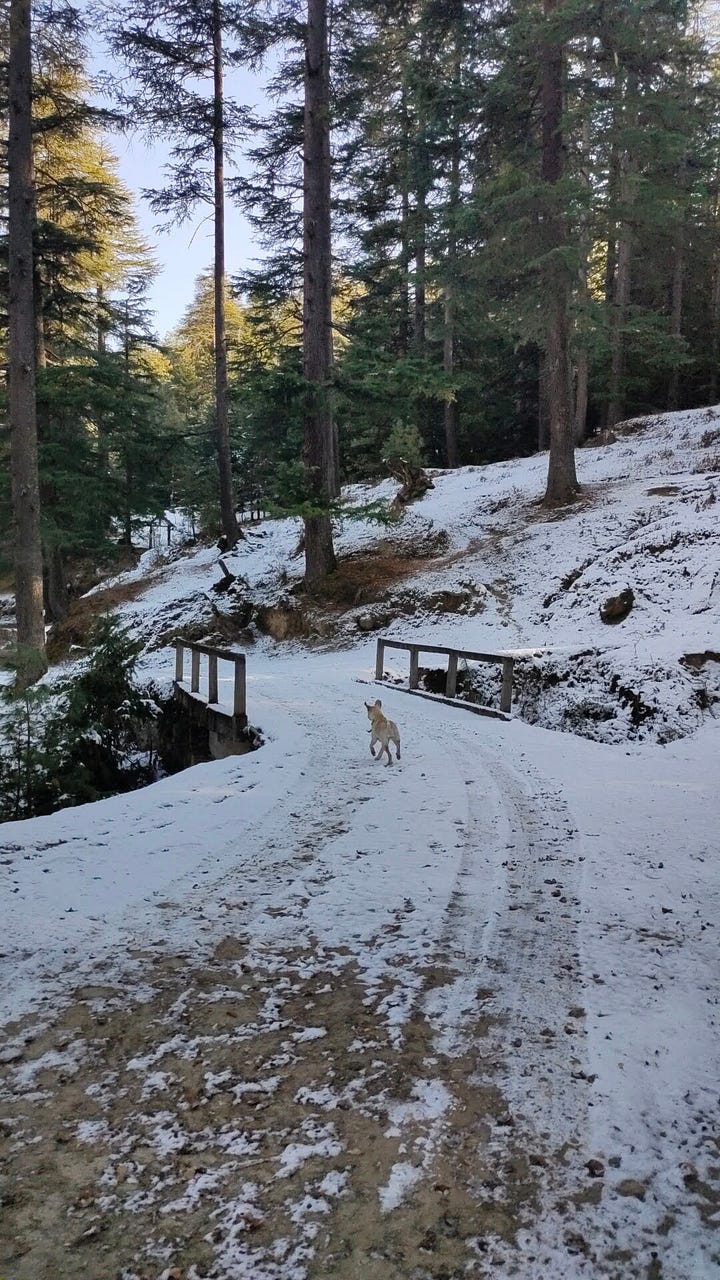


How do you pick your accommodation?
My choice of accommodation depend on my mood:
Solitude mood →Homestay
Social mood → Hostels
Hostels
I love staying in hostels. They're a fantastic way to meet new people. I’ve had the privilege of meeting tons of interesting people through this, leading to some great friendships that have lasted over the years. In fact, one of my best friends is someone I met in a hostel (Hostel Mantra) in Udaipur 2yrs ago.
I have a strong preference for non-chain hostels, independent hostels as opposed to popular chains like Zostel, Hosteller, GoStops. I’ve explained my reasons in detail in this tweet thread.
Like with travel destinations, I typically find good independent hostels through word-of-mouth recommendations from my traveller friends. Hostelworld is also a good source to discover hostels, though I've rarely had to use it myself.
Hostels are also budget-friendly (not zostel fk them), typically costing around 300-400 INR per night, which helps me keep my travel expenses under control.
Homestays
I love staying in true homestays. I say “true” homestays, because most places that advertise as homestays are really just hotels that operate under a homestay registration, typically for tax reasons.
A genuine homestay experience means living with the family that runs it. You stay in a regular room in their house, share their meals, and sometimes even help out with their daily tasks. These types of homestays are quite rare, but in my experience, they invariably lead to beautiful experiences.
It's important to remember that such homestays are typically simple and don't offer luxury comforts. Please be mindful of this and respect the setting. Don’t be that demanding asshole who goes to a mountain village homestay and ask for Chocolate Pancakes for breakfast.

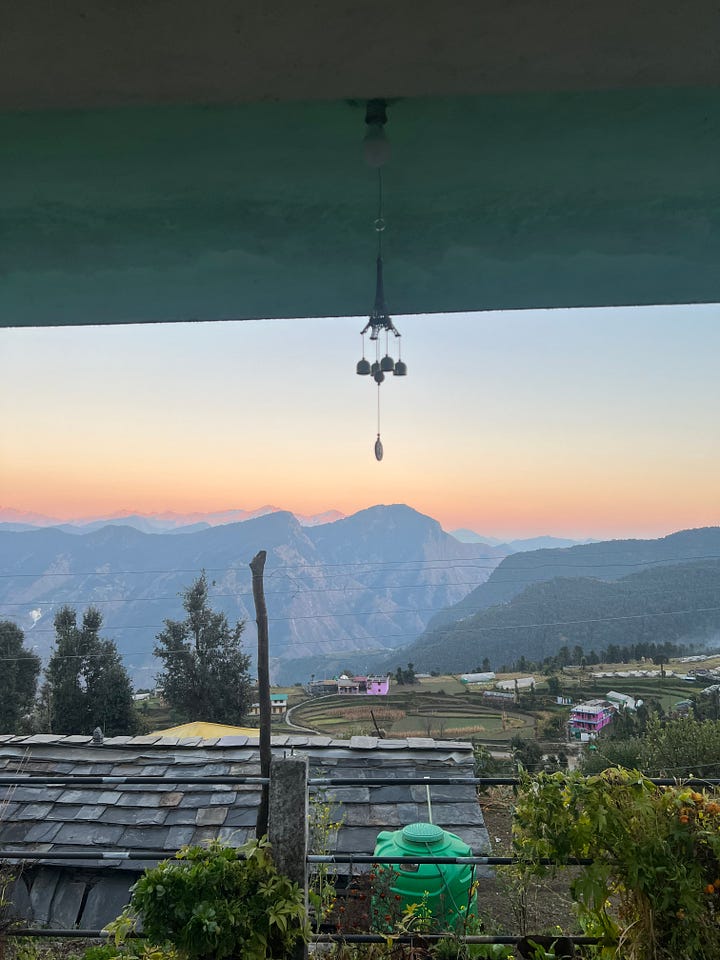
How do you maintain a healthy routine?
I don’t. lol.
Constantly shifting places does wonders for breaking bad habits, as each new place and setting feels like a fresh start. However, this same factor makes it incredibly challenging to build and maintain good habits.
I wish I could offer you some insightful tips here, but I haven’t really cracked it myself. If you have any advice, I'm all ears and eager to learn.
Does it not get lonely? How does Dating work? Where is all this going? Are you happy with this life-style? How long are you planning to live like this? How has travel changed you?
Jesus Christ dude, calm down. This post has already gotten too long, so I’ll tackle all the personal & emotional stuff in another post. Happy?
—
Until then, goodbye.
Merry Christmas and a Happy New Year!
May your next year be filled with fulfilling travel experiences and uplifting adventures.


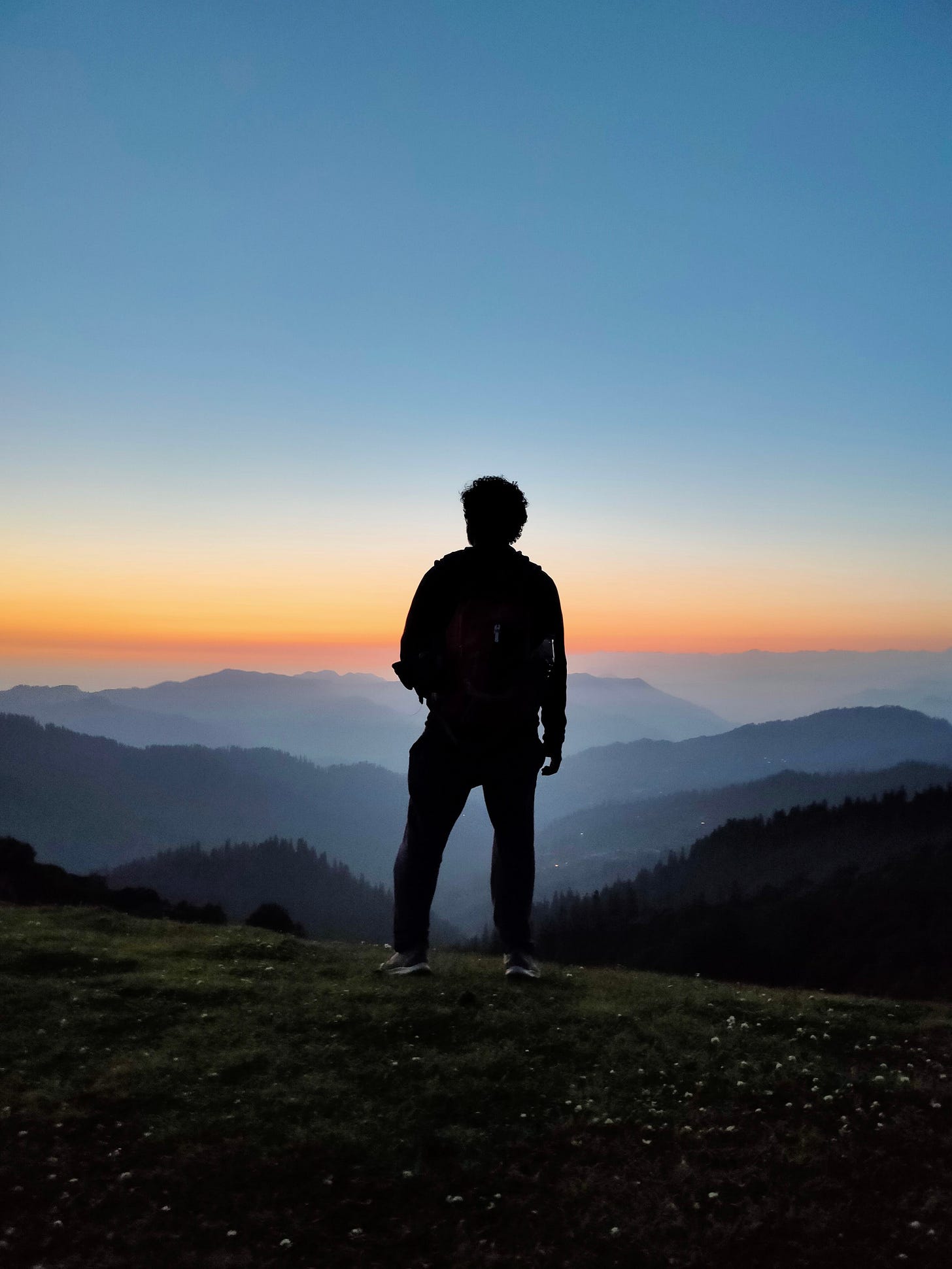

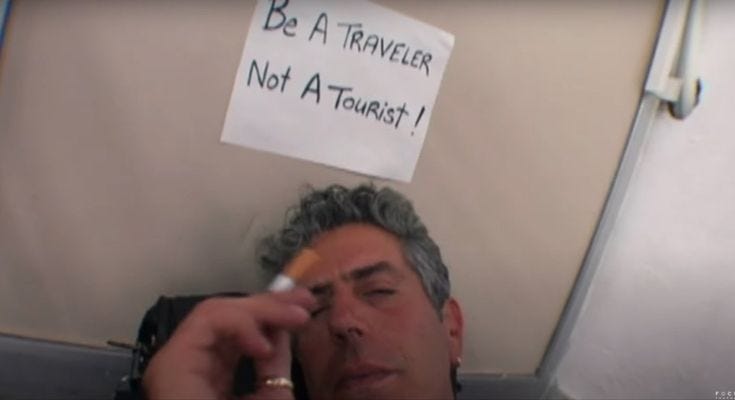

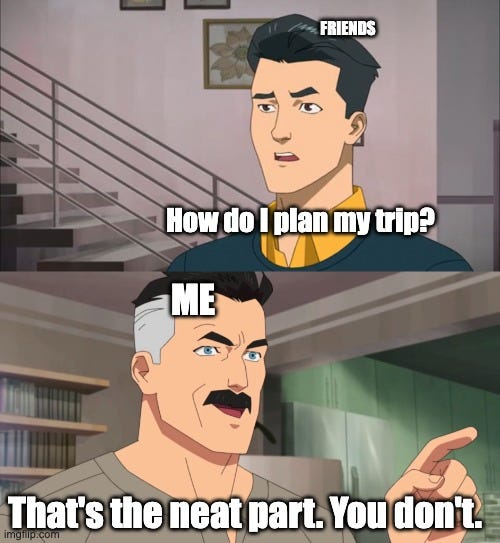
This article is quite detailed and helpful :)
I have started to run - so that some constant fitness routine exists. I was in Bratislava and had this idea and explored all running trails on allTrails - i found out there was a coronation trail too - i won't get into details - but it was a good way to pick up some history of the city too.
Loved It.